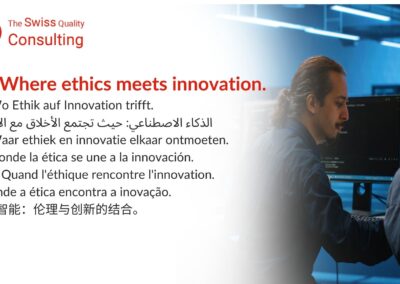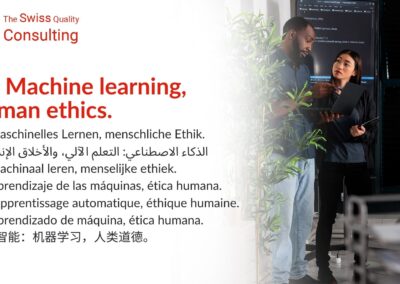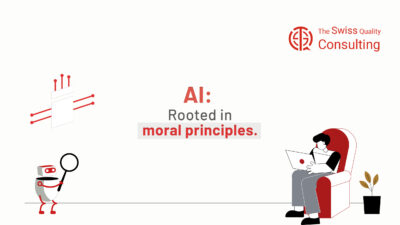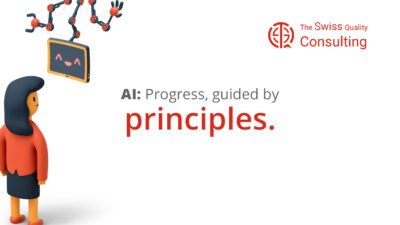Fostering Accountability, Transparency, and Fairness in the Digital Age
The Importance of Accountability in Technological Innovation
The principles of digital ethics emphasize the importance of accountability, transparency, and fairness in technological innovation and application. In the rapidly evolving landscapes of Saudi Arabia and the UAE, these principles are crucial for ensuring that technological advancements, particularly in fields such as Artificial Intelligence (AI) and Blockchain, are developed and deployed responsibly. Accountability in technology refers to the obligation of organizations to ensure that their technological solutions are used ethically and that any negative impacts are addressed promptly and effectively.
In cities like Riyadh and Dubai, where technology-driven projects are rapidly transforming urban life, maintaining accountability is paramount. For instance, AI algorithms used in public services and smart city initiatives must be designed to avoid biases and ensure equitable outcomes. Businesses must implement robust frameworks to monitor the use and impact of their technologies, ensuring that they align with ethical standards and societal values. This involves setting up dedicated teams to oversee ethical compliance and regularly auditing technological practices to identify and mitigate potential issues.
Furthermore, accountability extends to protecting user data and privacy. With the increasing integration of AI and IoT devices in everyday life, there is a growing need for stringent data protection measures. Organizations must be transparent about how they collect, store, and use data, ensuring that users are fully informed and consenting. By prioritizing accountability, businesses in Saudi Arabia and the UAE can build trust with their stakeholders and contribute to the sustainable and ethical growth of the digital economy.
Ensuring Transparency in AI and Blockchain Technologies
Transparency is a cornerstone of digital ethics, particularly in the context of AI and Blockchain technologies. Transparency involves openly sharing information about how technologies work, including their algorithms, data sources, and decision-making processes. This openness is crucial for building trust and allowing users to understand and verify the fairness and accuracy of technological applications. In the Middle East, where trust in technology is a key factor in its adoption, transparency can significantly enhance user confidence and engagement.
In the realm of AI, transparency is essential for addressing concerns about algorithmic bias and discrimination. AI systems can inadvertently perpetuate biases present in their training data, leading to unfair outcomes. By making AI processes transparent, organizations can identify and correct these biases, ensuring that their technologies promote fairness and inclusivity. In Dubai, for example, government initiatives are focusing on creating transparent AI frameworks that allow for public scrutiny and input, fostering a collaborative approach to ethical AI development.
Blockchain technology, known for its inherent transparency, offers a unique opportunity to enhance trust in digital transactions and data integrity. The decentralized nature of Blockchain ensures that all transactions are recorded on a public ledger, which can be accessed and verified by anyone. This level of transparency is particularly beneficial for sectors such as finance and supply chain management, where trust and verification are critical. In Saudi Arabia, businesses are leveraging Blockchain to enhance transparency in various applications, from financial services to healthcare, ensuring that all stakeholders can verify and trust the data.
Promoting Fairness in Technological Innovation
Fairness is a fundamental principle of digital ethics, ensuring that technological innovations benefit all segments of society without discrimination or bias. In the diverse and dynamic environments of Saudi Arabia and the UAE, promoting fairness in technology is essential for achieving inclusive growth and development. Fairness in technology involves designing systems that do not favor any particular group and ensuring equal access to technological benefits.
One of the key challenges in promoting fairness is addressing the digital divide. In rapidly developing cities like Riyadh and Dubai, there is a need to ensure that all citizens have access to the latest technological advancements. This involves investing in digital infrastructure, providing affordable access to technology, and offering education and training programs to enhance digital literacy. By bridging the digital divide, governments and businesses can ensure that the benefits of technological innovation are shared equitably.
Additionally, fairness in AI and machine learning involves developing algorithms that are free from bias and discrimination. This requires a careful and systematic approach to data collection, ensuring that the data used to train AI systems is representative and unbiased. Organizations must also implement regular audits and assessments to detect and correct any biases that may emerge. Executive coaching services can support business leaders in understanding the ethical implications of AI and developing strategies to promote fairness in their technological innovations.
The Role of Executive Coaching in Upholding Digital Ethics
Executive coaching plays a vital role in helping business leaders understand and uphold the principles of digital ethics. In Saudi Arabia and the UAE, where technological innovation is a key driver of economic growth, executive coaching can provide the guidance and support needed to navigate the complex ethical landscape of digital technologies. By focusing on accountability, transparency, and fairness, executive coaches can help leaders develop ethical strategies that align with their organizational values and societal expectations.
Coaching can enhance leaders’ awareness of the ethical implications of their decisions, ensuring that they consider the broader impact of their technological innovations. This includes understanding the potential risks and benefits of AI, Blockchain, and other advanced technologies, and developing policies and practices that promote ethical use. In Riyadh and Dubai, where businesses are at the forefront of technological adoption, executive coaching can help leaders balance innovation with ethical responsibility, ensuring sustainable and inclusive growth.
Moreover, executive coaching can support the development of ethical leadership skills, enabling leaders to foster a culture of ethics within their organizations. This involves creating an environment where ethical considerations are integral to decision-making processes and where employees are encouraged to voice concerns and contribute to ethical practices. By promoting a culture of ethics, leaders can ensure that their organizations remain committed to the principles of digital ethics, even as they pursue technological advancements.
Conclusion: The Future of Digital Ethics in Technological Innovation
The principles of digital ethics—accountability, transparency, and fairness—are essential for guiding the responsible development and application of technological innovations. In regions like Saudi Arabia and the UAE, where technological advancements are rapidly transforming society, these principles provide a framework for ensuring that technology serves the broader interests of society. By embracing digital ethics, businesses can build trust with their stakeholders, promote inclusive growth, and contribute to the sustainable development of the digital economy.
For business leaders, executive coaching offers valuable support in understanding and implementing these principles. By developing ethical strategies and fostering a culture of ethics, leaders can navigate the complexities of technological innovation and ensure that their organizations contribute positively to society. As we look to the future, the continued commitment to digital ethics will be crucial for achieving a balanced and equitable digital landscape, where the benefits of technology are shared by all.
—
#DigitalEthics #AccountabilityInTechnology #TransparencyInAI #FairnessInInnovation #ArtificialIntelligence #SaudiArabia #UAE #Riyadh #Dubai #BusinessSuccess #ModernTechnology #ExecutiveCoaching #LeadershipSkills























